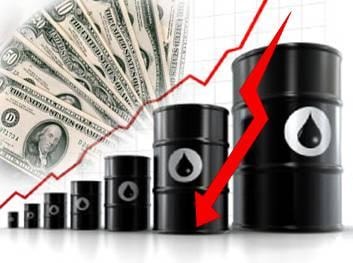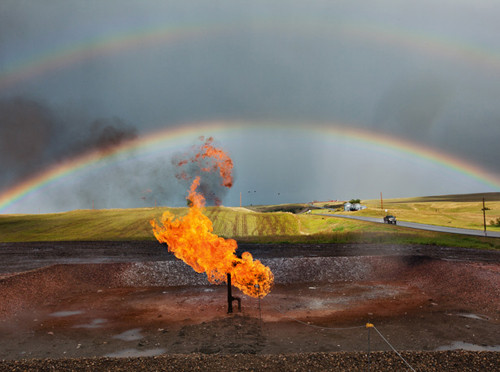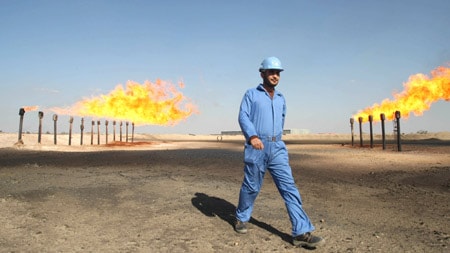Low oil prices shift geopolitical power to the US
The current climate of abundant energy supplies and low prices has transformed the world’s geopolitical landscape. Some countries have suffered while others have benefited.
The surge in US oil production has prompted Washington and its allies to impose tough sanctions on Iran without fear of losing oil imports from the Middle Eastern country.
Meanwhile, Russia faces the prospect of what President Vladimir Putin called “a potential tragedy” as oil prices plummet and Moscow grapples with harsh sanctions from Washington and the West.
The loss of vital revenue due to the sharp decline in oil and gas prices in the late 1980s contributed to the collapse of the Soviet Union. The oil market downturn also contributed to Iraqi leader Saddam Hussein's decision to invade Kuwait in 1990, triggering the first Gulf War.
 |
| The sharp drop in crude oil prices is bad news for many oil-exporting countries. |
Besides Russia, fluctuations in oil prices also put Iran and Venezuela in a difficult position. On the contrary, the US and China have the opportunity to take the lead.
The US shale oil and gas revolution has ushered in “an era of cheap oil”. “There is no doubt that geopolitical changes will be inevitable”, said Ed Morse, director of Citigroup, a leading global commodity research firm.
Important geopolitical commodity
According to Ms. Reva Bhalla - Vice President of global consulting firm Stratfor, oil - concentrated mainly in the Middle East - is "the most important geopolitical commodity", capable of orienting the global economy.
Benchmark oil prices in the New York market have fallen more than 30% in the past 5 months, fluctuating at 75 USD a barrel, while US crude oil productivity has reached its highest peak in the past 3 decades, thanks to bustling production activities in shale oil fields in North Dakota and Texas.
 |
| Natural gas gushes from a well in North Dakota. |
According to weekly data released by the US Energy Information Administration, in the first week of November, US oil production reached 9.06 million barrels/day – the highest since January 1983.
“For the past 10 years, the oil market has been driven by China’s growth and demand. Now the incredible growth of the US oil and gas industry is the new driver,” said Daniel Yergin, vice president of Colorado-based industry consultancy HIS.
Oil price war
Saudi Arabia and Kuwait have waged a “necessary price war” to protect their markets and force producers in the US and other countries to reduce production.
So far, American companies have not wavered in the face of Saudi Arabia's "market manipulation plot" and believe that they are stronger than many members of the Organization of the Petroleum Exporting Countries (OPEC).
“Saudi Arabia is playing a big game. If the oil giant cuts oil prices to $60-$70 a barrel, the US market will slow down, but it will not stop growing,” said Archie Dunham, CEO of shale oil producer Chesapeake Energy in Oklahoma.
In addition, terrorist attacks on major oil fields in the Middle East could cause energy prices to rise again.
Revenue from oil exports
On October 29, Iranian President Hassan Rouhani announced that the country's oil export revenue had fallen by about 30%. According to data from Bloomberg, Iran needs to reach a record price of $143/barrel to keep the national budget stable. Like Russia, Iran's economy has been weakened by economic sanctions stemming from Tehran's controversial nuclear program. "Economic blows" from the US and its allies have closed most investment in Iran's oil and gas fields over the past decade and restricted any access to new technology.
Falling oil prices and a November 24 deadline for a nuclear deal have increased pressure on Rouhani, who was elected last year on a reform drive aimed at ending inflation and reviving Iran’s economy. If Rouhani can strike a deal and sanctions are lifted, Tehran’s economy could emerge from the black.
 |
| Oil is a factor that has the potential to drive the world economy. |
For Venezuela, the plunge in oil prices is also bad news. The Venezuelan economy was already on the brink of a cliff with inflation reaching 63%. President Nicolas Maduro announced on November 13 that Caracas had lost 30% of its foreign exchange earnings last month due to falling oil prices. Maduro said he had sent his foreign minister to five major oil-exporting countries, including Mexico and Russia, to garner more support ahead of the upcoming OPEC meeting on November 27.
Raising America's status
America is emerging as the big winner. Increased energy independence reduces the risk of foreign supply disruptions. Energy independence also strengthens Washington’s voice in international negotiations, such as with Iran over its nuclear program or with Russia over the Ukraine crisis.
In addition, the boom in US oil and gas production has enhanced the country's international reputation, which had been overshadowed by the financial crisis stemming from the US housing market turmoil.
In addition, in the context of low oil prices, China is also considered a big winner because 60% of its crude oil is imported from outside. Last May, China and Russia signed a historic gas supply contract worth 400 billion USD for 30 years. Continuing to strengthen cooperation, in early November, the leaders of the two countries reached a preliminary agreement on the construction of a second gas pipeline running directly from Russia to China. Beijing will always be the beneficiary of this supply contract as long as crude oil prices remain low. The world's second largest economy is likely to use the above savings to build strategic reserves rather than spending on defense and improving the environment.
According to news






